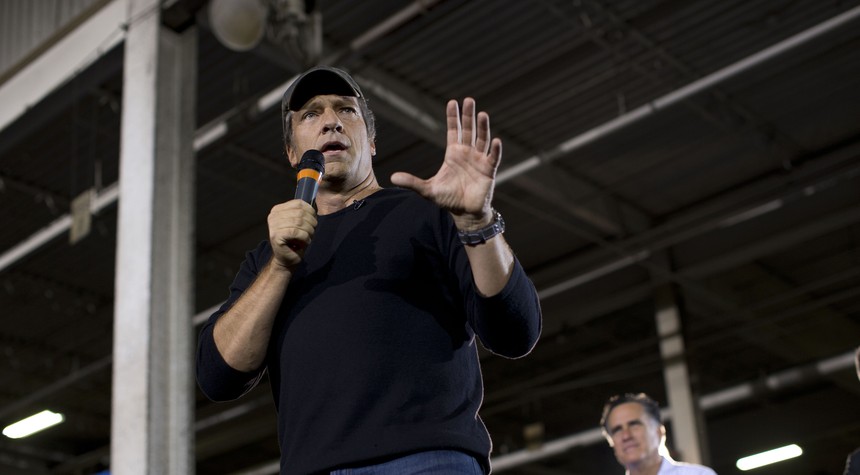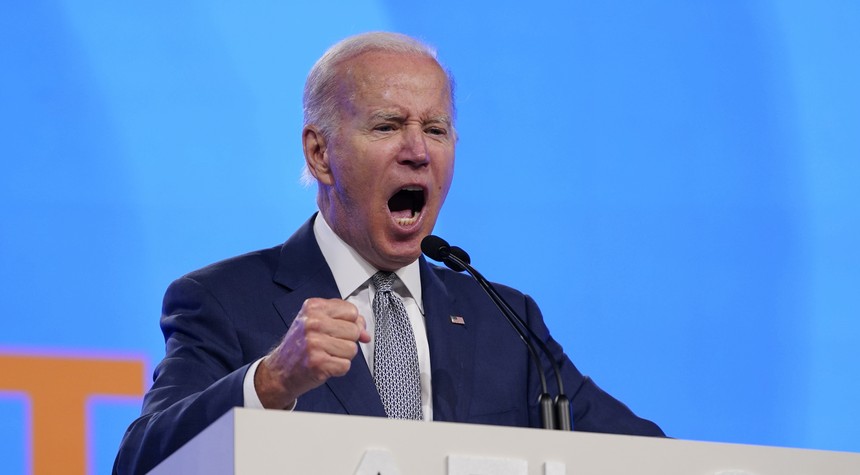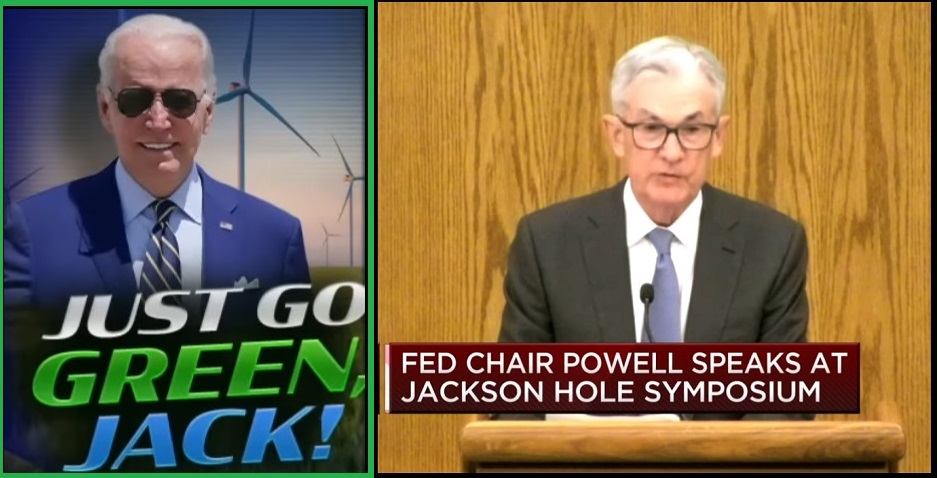If you’ve followed the media in recent years, you’ve probably encountered the expression “dog whistle.” It’s usually accompanied by the qualifier racist, homophobic, xenophobic or some other adjective meant to scare suburban MSNBC viewers who are afraid of any primitive country bumpkin two exits away. The suggestion is that conservative voters are so beholden by their prejudices and anger that certain terms will flip a switch in their minds that cause them to go on a rampage, in the manner a dog responds to a whistle.
But recently one of the media’s own pet “principled” Republicans employed one of the most egregiously inflammatory dog whistles three is. In an interview with Ed Pilkington of the Guardian former Arizona House of Representatives Speaker Rusty Bowers claimed that “the Constitution is hanging by a thread.”
Some readers may be hitting the brakes about now and asking what makes that turn of phrase a “dog whistle.” Bowers, who has attracted national attention as one of the witnesses of the House Select January 6 committee and a Republican critic of Donald Trump, like Rep. Liz Cheney (R-Wyo.), has recently taken a shellacking in his primary. But Bowers also happens to be a member of the Church of Latter-day Saints.
The White Horse Prophecy supposedly spoken by church founder Prophet Joseph Smith in 1843 to two adherents, the English born Edwin Rushton and Theodore Turley is part of LDS theology. Rushton gave over the prophecy in 1900 and it became a controversial topic among LDS adherents, both because of the dubious nature of his witness claim and its contents.
The prophecy held that the United States Constitution would one day be “hanging by a thread as fine as silk” and that members of the Church of LDS would step in during this time of great turmoil and chaos and bring about the Final Salvation.
In his interview with Pilkington, Bowers makes direct reference to his LDS faith and his family’s four generations living in Arizona. The LDS according to one report had 430,000 adherents in Arizona in 2020. Its voting base was seen as one of the key traditionally Republican constituencies vulnerable to swing for Democrats.
While the Church of LDS has traditionally been very conservative and its stronghold of Utah is one of the most solidly Republican-voting states, politicians affiliated with LDS have frequently feuded with Donald Trump since he announced for the presidency in 2015. Among the church figures with whom he has feuded is the reporter McKay Coppins who in 2014 wrote a disparaging article after accompanying him on the super-early New Hampshire campaign trail. Coppins then predicted that Trump’s run was all boast and bluster, as did many at the time.
Trump reacted by calling Coppins a “dishonest slob.” Trump then furtherearned the enmity of important Mormon politicians like Senator Jeff Flake (R-Ariz.), Senator Mitt Romney (R-Utah) and former Senator Harry Reid (D-Nev.). In 2016 a so-called conservative “spoiler” ticket was headed by former CIA agent Evan McMullin, himself an LDS adherent. The strategy behind McMullin’s candidacy was to draw away enough votes in Utah and other LDS heavy states to deny Trump the required 270 electoral votes to win, but it ultimately became irrelevant as they split the anti-Trump vote with Hillary Clinton to give Trump a plurality, and he had enough electors without needing Utah’s.
While it isn’t simple to credit LDS aversion to Donald Trump to any onemotivation, his marital infidelity, propensity for vulgarity, and egotistical personality certainly are turn-offs for members of a church that shuns alcohol and stimulants and preaches modest public conduct. Not all LDS Republicans turned on Trump, however; Senator Mike Crapo (R-Idaho) and RNC chair Ronna Romney-McDaniel have remained on his good side, and Romney’s Utah colleague Senator Mike Lee has largely been supportive of the former president.
From the Pews to the Podium
For the Left, the spectre of the Religious Right, a loose group of evangelicals and other Christian groups that have long lobbied against loose morality and abortion access, in recent times has morphed into an even more fearsome bogeyman, “Christian nationalism.” Journalists continually rail against this movement and its supposed standard-bearers such as Representative Marjorie Taylor Green (R-Ga.), state Senator Doug Mastriano (R-Penn.) and Florida Governor Ron DeSantis.
The use of the language from the White Horse Prophecy confirmsthat religious demagoguery is now wielded by Democrats and anti-Trump Republicans for political purposes. When Trump relocated the U.S. Embassy in Israel from Tel Aviv to Jerusalem in 2018, critics panned the move as a giveaway to wealthy Jewish and evangelical Christian donors, the latter of whom they accused of attempting to usher in the Rapture. Because of Trump’s playboy reputation and lack of any religious piety in his track record, they usually attributed these actions as him being suckered by more devout acolytes like Mike Pence and Secretary of State Mike Pompeo. He was also widely mocked in September 2021 for appearing at an event for a group affiliated with the Reunification Church (the “Moonies,”) originally a Korean Christian sect with a history just as controversial as the LDS.
The modern Church of Latter-day Saints eschews the White Horse Prophecy, seeing it as a discredited tall tale as well as a bugaboo that encourages suspicion and scorn by outsiders. That doesn’t mean it hasn’t been used for political purposes among LDS political activists. In 2019 during the first impeachment trial of Donald Trump several major daily newspapers published an op-ed by Mormon memoirist Judith Freeman in praise of Mitt Romney’s would-be savior (“white horse”) role in being the person to break the Republican wall of resistance against a conviction vote, and asserted that in her own family the White Horse Prophecy had been repeated including the phrase stating “the Constitution would be left hanging by a thread.”
Republican LDS politicians in the past also used it in order to convey their own righteous indignation (or more than that), and have been called out by Democrats and the media for religious demagoguery, while in the context of fighting Trump, however, they are praised for inspiring Mormon courage.
Ahead of the 2000 election Mormon Senator Orrin Hatch (R-Utah) invoked the same language: “They tolerate everything that’s bad, and they’re intolerant of everything that’s good. Religious freedom is going to go down the drain, too. I’ve never seen it worse than this, where the Constitution literally is hanging by a thread.” Critics pointed at this statement as a dangerous indication that he saw himself filling the role of a Mormon savior.
The Blaze founder and LDS convert Glenn Beck has used the phrase many times throughout his career, leading Washington Post columnist Dana Milbank to write a book in 2010 exploring it as a dangerous extremist phenomenon.
The late Sen. Bob Bennett (R-Utah) was reported by the LDS-oriented Deseret News of Utah to have invoked the White Horse Prophecy to friends and family and then point at Democrat colleague and personal friend Harry Reid, claiming that he would be the person to save the Constitution.
During the first Trump impeachment the Salt Lake Tribune published a guest column titled “Imagine you’re Mitt Romney” which gushed about how special the senator must feel that he could be in the vanguard of 20 GOP senators voting to removing Trump from office. The author was a direct descendant of two former church presidents of the LDS.
If the expression didn’t have such deep resonance, LDS politicians would not keep using it. The question is whether church faithful actually take it seriously or find it to be just a lot of hot air.
The Prayer Book and the Ballot Box
Religion is habitually exploited by both parties, often with the goal of inserting it into the political process as they see fit. The Republican cases are too numerous to cover in one article, but that’s to be expected given they are still regarded as the vehicle for the “Religious Right.”
What is often ignored are the transparently disingenuous claims of Democrats to support separation of church and state. Theys only do that when it is convenient. Jimmy Carter was a progressive Democrat for his time and a devout Christian whose sister Ruth Carter Stapleton was an evangelist and believer in faith healing. In 2018 he wrote in his book Faith: A Journey for All: “I believe now, more than then [during his presidency], that Christians are called to plunge into the life of the world and to inject the moral and ethical values of our faith into the processes of governing.”
Senator Raphael Warnock is a reverend at Atlanta’s Ebenezer Baptist Church. He garnered much criticism for his 2021 tweet: “The meaning of Easter is more transcendent than the resurrection of Jesus Christ. Whether you are Christian or not, through a commitment to helping others we are able to save ourselves.” This statement was blasted for contradicting a number of beliefs contained in the Bible, such as that there is salvation only through Christ or the idea expressed in 1 Corinthians that if there were to not be a resurrection then all Christian preaching would be useless. And then there was the bizarre appearance by New York Democratic Governor Kathy Hochul at a Brooklyn church in 2021 where she told the parishioners that vaccines are “from G-d” and alleged that the unvaccinated are ignoring Him.
Rusty Bowers’ statement “the Constitution is hanging by a thread” is by no means an original thought, and its timing is ironic given that he was unceremoniously retired against his will in a party internal primary. What comes after the events of the White Horse Prophecy? It’s hard to say whether instant salvation is achieved or the world goes through a violent cataclysm. But with frequent talk of a national divorce or even new civil war in the media and among partisan activists, Bowers’ use of the terminology shows how callous the Left, the media, and the NeverTrumpers are when their own standard-bearers use inciting language that they would never accept from the other side.










